Bengaluru Traffic Police (BTP) has been on a drive towards automation over the past decade. More and more challans are being added on their website, and people are expected to find them and pay their dues. While this might give BTP a bit of breathing space to concentrate on more stringent violations, that does not seem to be what is happening. Here, I analyse BTP’s shift towards automation over the years while looking at how that has affected safety on the roads.
While automation suggests intelligent systems like cameras and detectors that can catch different types of violations, including overspeeding, in the case of BTP, it is an umbrella term for all cases logged online. A signal-jumping caught on camera, a traffic policeman who snaps a picture of a rider without a helmet in traffic, a complaint filed by a citizen through the public-eye portal, all of them come under automation; basically, all those cases where you log into their website to find your violations come under automation.
Shift towards automation
The mantra for BTP over the past decade has been towards more automation. While the number of violations caught in person has remained stable, the number of automation cases increased steadily over the past decade. Since COVID-19 hit, physical monitoring took a back seat and automation filled the gap, ensuring that there was no dip in the total number of cases.
A year after the pandemic, physical monitoring cases continue to dip with the focus being on automation. This means fewer traffic police personnel on the streets catching motorists violating traffic rules. Rules and the backlash against towing have also reduced the presence of towing vehicles on our streets.
Even while the share of violations caught by automation was increasing over the years, the share in fines paid for those violations remained pretty low. This was mainly because few motorists would look up the mostly unstable traffic police website, find if they had any violations and pay their fines online. Without a notification mechanism informing a motorist of a violation, a voluntary check-and-pay system was yielding little rewards.
In late 2022, the traffic police introduced a 50% discount for online fines, which helped them realise a lot of their automation fines. This made people check their violations and pay the much lower penalties. The discount system continues as of today, and finally traffic fines from automation are showing up as a large chunk of fines collected.
However, a large share of the fines continues to be from physical violations booking despite the number of cases being a small fraction of what it used to be before the pandemic.
Traffic violations on the streets
Automation can catch only some of the cases. Reckless driving, driving under the influence, high-beam usage, wrong-side driving are violations that need boots on the ground. The focus on automation, however, has meant that there are much fewer boots on the ground as seen in the dip in non-automation cases, and that is getting reflected in the numbers of different types of violations over the years.
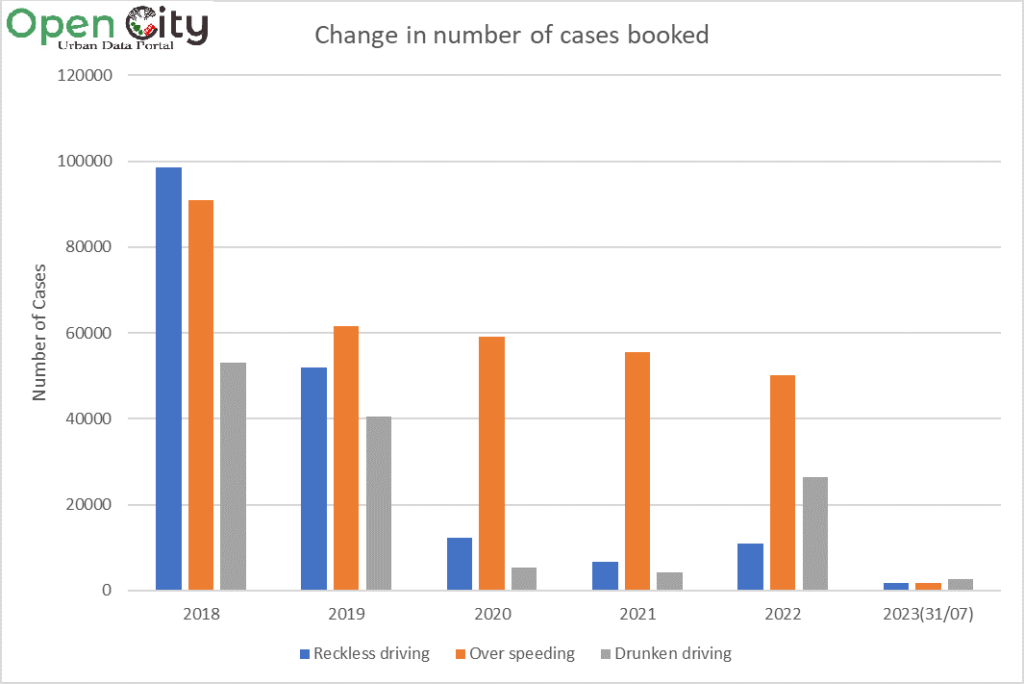
Reckless driving, overspeeding and drunk driving cases have all seen a massive dip in 2023. While it is tempting to assume that people have developed a conscience and better driving skills overnight, it is mostly to do with poor policing on the ground.
Except for “interceptors” standing in different parts of the city booking overspeeding, policing in general has been coming down. Since 2023, even the interceptors have been missing in action for a while as reflected in the massive dip in overspeeding cases.
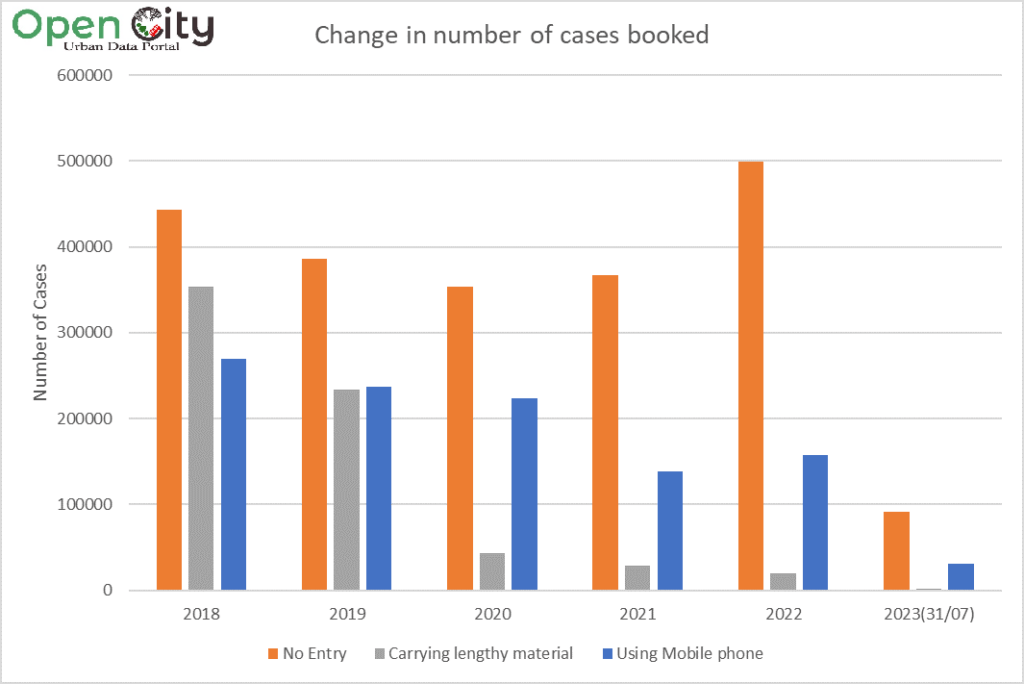
Despite rampant wrong-side driving and no-entry rule violations, the number of cases booked is a small fraction of what it was in 2022, despite being close to a lakh over the past seven months. Carrying lengthy material is almost a non-offence now. Mobile phones, however, continue to be booked, even in smaller numbers. Do remember this, next time you reach for your phone while driving or riding.
Read more: Criminalising routine traffic offences could seriously impact citizens
The violations that continue to get booked are the low-hanging fruits – helmetless riders and signal-jumping. Easier to catch and book online, they are also the biggest earners for the police, with more than 3.7 million cases in just seven months.
While pillion riders seem to be getting away, signal jumping is more than making up for it. These are the violations where automation is deployed to the maximum and the massive numbers here show that it is working, at least in terms of earning revenue for the police. The evidence for whether motorists are discouraged from jumping signals or encouraged to wear helmets due to automation is clearly missing.
We need to pause for a moment here, and question the goal of the traffic police when it comes to booking of violations. If the goal is to get more revenue, booking more violations through automation, and running a well-publicised discount campaign can rake in the money. Combine this with reduced beats on the ground and you are also saving money at the other end. Perversely, hiding behind cameras and encouraging people to violate traffic rules more would thus be beneficial for the traffic police.
In the short as well as the long term, this would have a very deleterious effect on road safety.
Whither road safety?
With the traffic police taking a step away from the roads, road safety is bound to be affected. Road accidents data for 2023, for the first six months, bear this out.
Instead of comparing annual data with half-yearly data for 2023, I have used a metric of number of accidents per month, which is the annual count divided by 12 for the full years, and divided by 6 for 2023. This gives a better idea of the change in the road safety scenario in Bengaluru.
Read more: Bengaluru: A comprehensive solution for decongesting the Hosur-Sarjapura Road junction
Looking at the road accidents per month for the past six years, we can see that there has been a significant increase of 46% in number of accidents per month in 2023 as compared to 2022.
More accidents means more fatalities. While there were 771 deaths from road accidents in 2022, the number from the first six months of 2023 is already at 499. Again, using the per month metric to compare the years, we see that there is a significant spike in 2023, of close to 30%.
In conclusion, while automation can definitely help bolster the presence of the police around the city, there is no substitute for them being on the roads. As much as this can help book violations, presence of interceptors as well cops on the street tend to act as traffic violation deterrents by themselves.
We are also seeing an increase in road-rage related incidents as well as crimes in different parts of the city. The police have now started recommending dash cameras for motorists.
There are talks of AI-powered cameras in the city to book a host of violations. Whether they will deter overspeeding and violation of other rules, and improve safety needs to be seen.
Even in terms of fine collections, while automation might work now, it will need constant publicising and discount campaigns to get people to pay up. The tech barrier also means that a lot of violators are not likely to log into BTP’s painfully unstable website to check for violations.
Having physical checkpoints and violations booking also helps bring automation cases to the fore and upfront payment of them. Most importantly, when it comes to traffic policing, out of sight means out of mind, and the very presence of traffic police in the form of interceptors or violation booking on the street to deter poor driving can never be substituted.
Srinivas Alavilli, a Bengaluru-based citizen activist and Fellow at WRI, India, says: “Physical presence of cops is a big deterrent. However, the right balance needs to be struck. My suggestion is to focus on a few areas, and fine every small violation. This is will send out a strong message to the public.” He adds:
“With regard to using dash cameras for road rage-related incidents, I don’t quite agree that citizens should be doing that, it is too much invasion of privacy. Physical presence of cops is important.”
Civic activist and trustee of Bangalore Environment Trust (BET), Dattatraya Devare, says that physical presence of cops is necessary. ” What happens is that people aren’t aware that they are under surveillance. Many aren’t aware of the kind of punishment there is for a particular violation, so considering this, there is a tendency to take a chance. I feel there should be public awareness on the different kinds of traffic violations.”
[This article has been republished with permission from OpenCity.in. The expert quotes have been added by Citizen Matters]
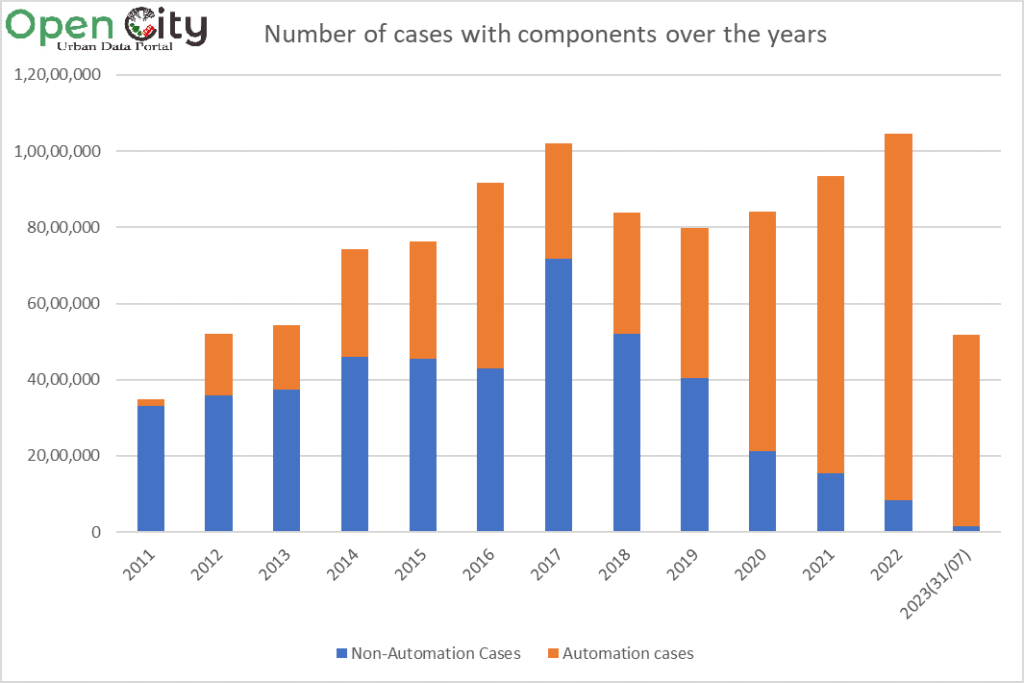
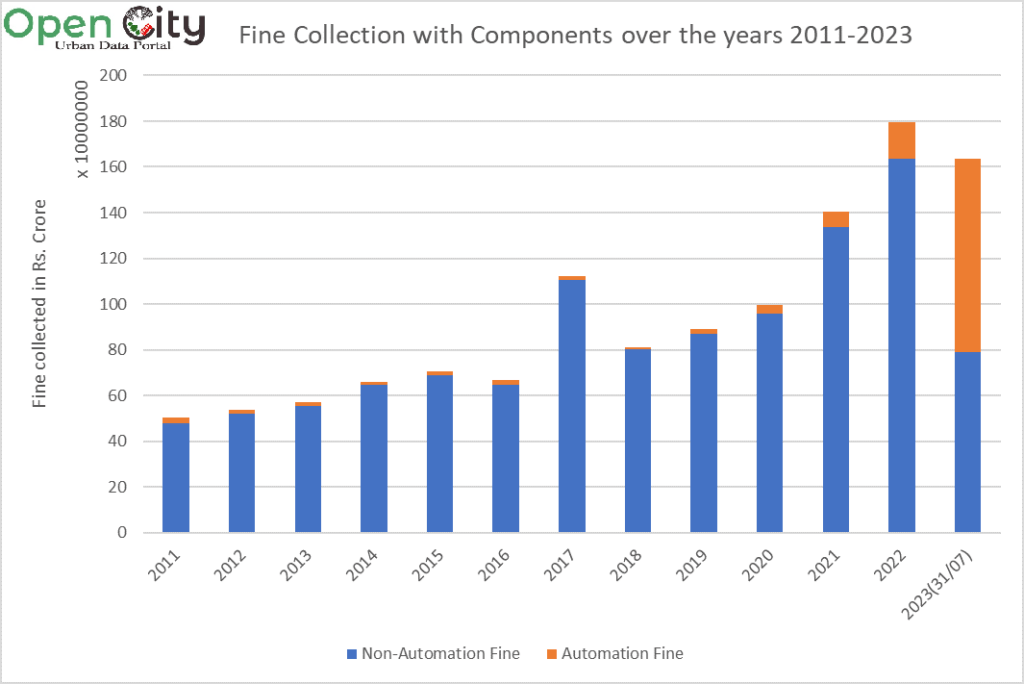
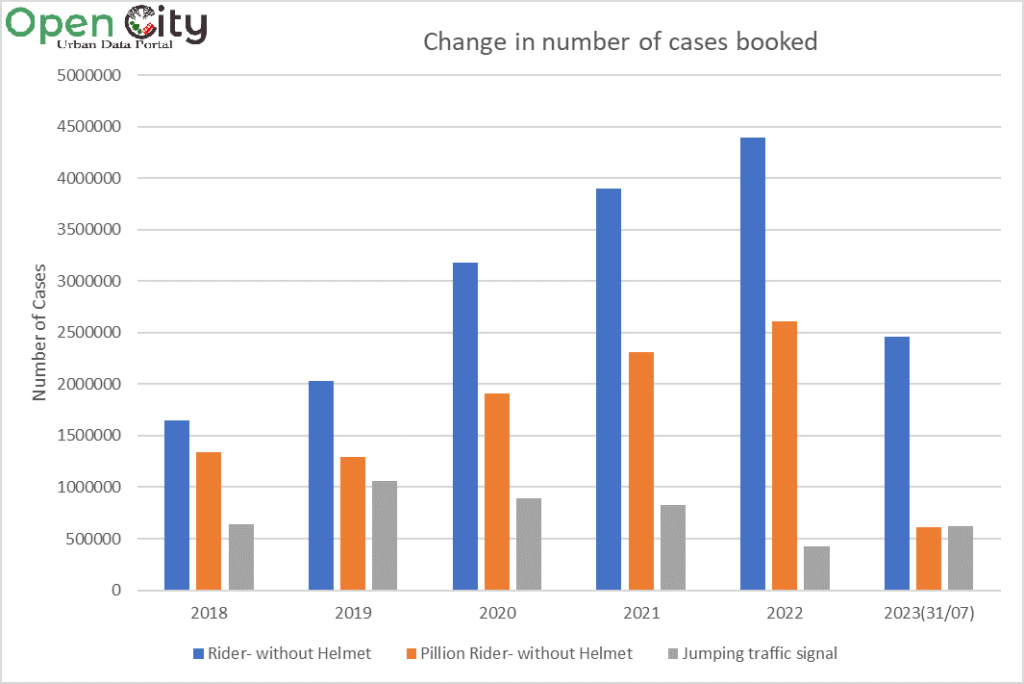
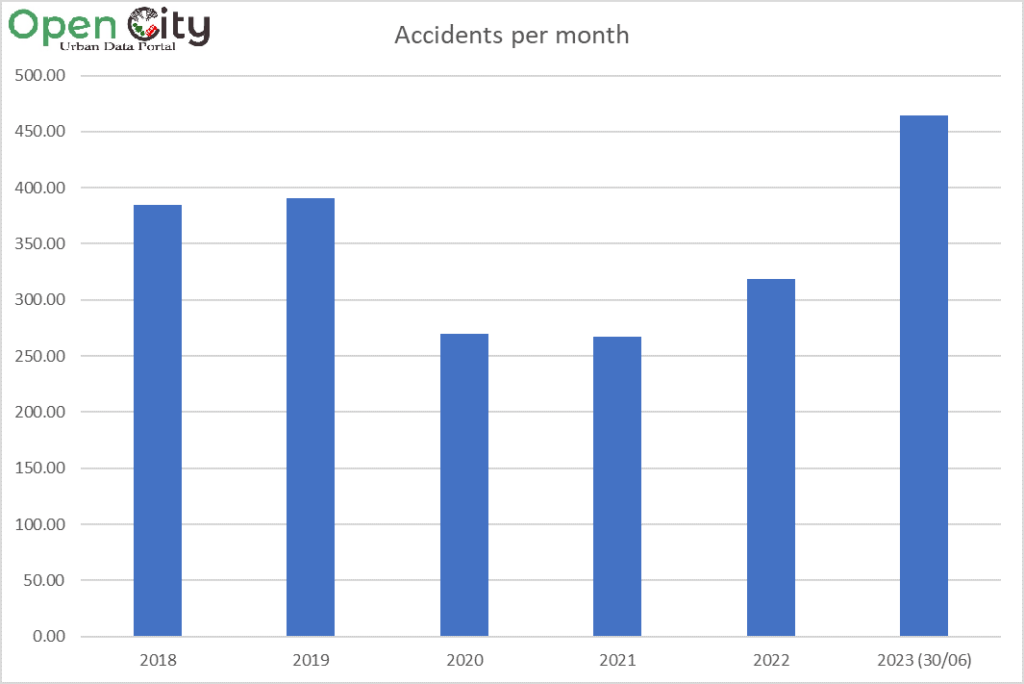
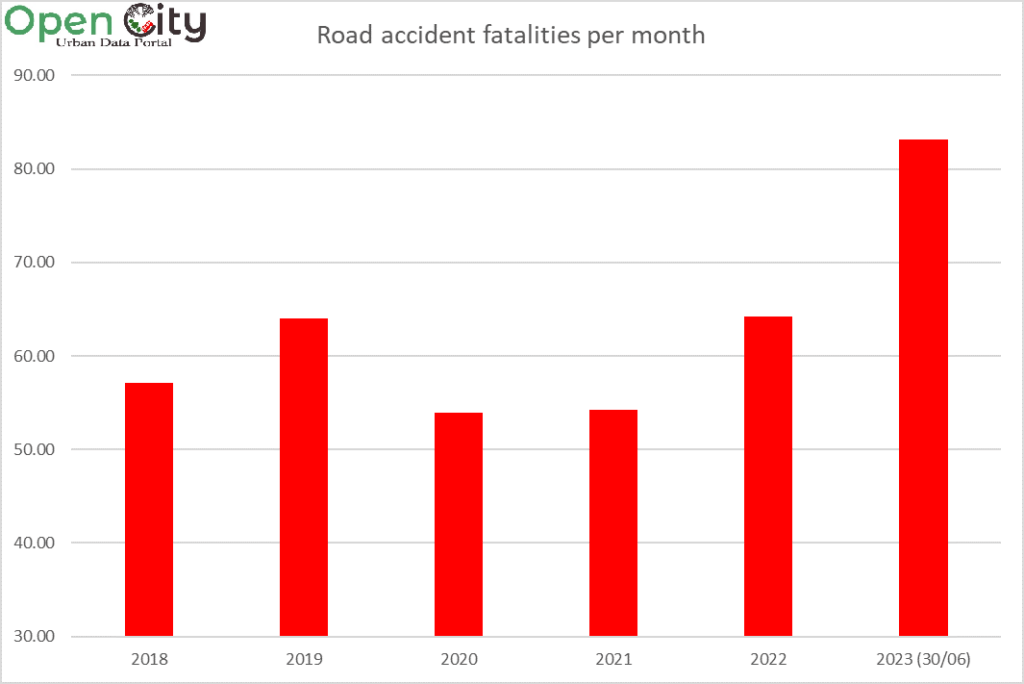
If you wish to hear a joke, here it is, “Accident happens in Bengaluru IF you follow traffic rules”. I have seen Bengalur over 5-6 decades and the traffic madness in Bengaluru is so discouraging that you don’t feel taking out your vehicle. More so, if you are a senior citizen – there is scant respect for you when you follow the traffic rules and try to educate the youngsters (forget about their language). I have lost hope that the traffic rules attract any respect in Bengaluru – more so when new additions on the road is increasing.